Carmen 101—Carmen in Pop Culture
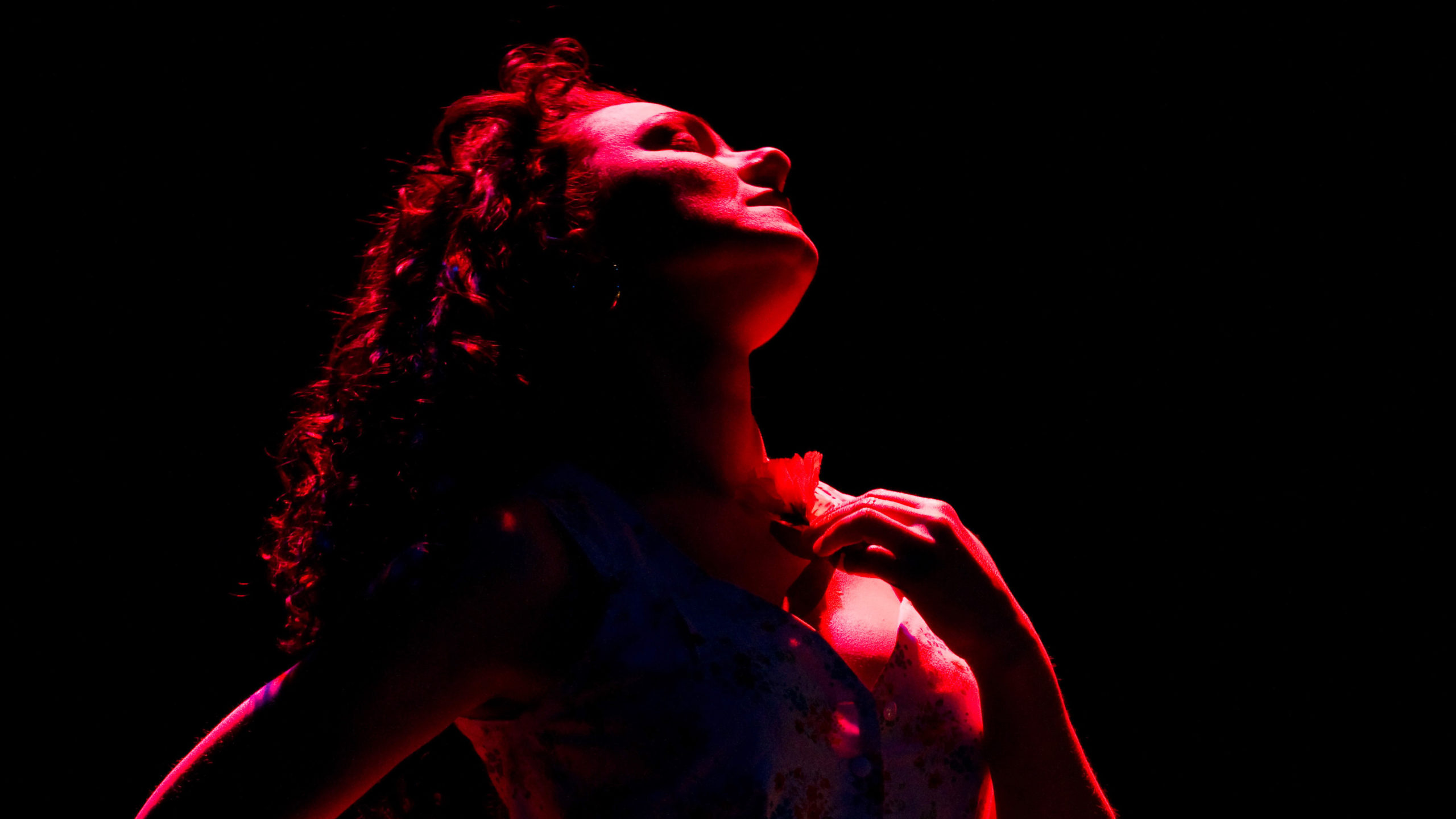
By: Angelica DiIorio
What do Doritos, The Muppets, and the Olympics all have in common? You would never guess it, but the answer is opera, specifically the “Habanera” from Bizet’s Carmen.
You have probably heard the “Habanera” somewhere before, even if it was just elevator music. Carmen has some of the most hummable tunes in opera, so its music has appeared many times in pop culture. Let’s explore where Carmen’s music or story appeared and, most importantly, listen to The Swedish Chef and Beaker croon Carmen’s “Habanera.”
You might recognize some of the music from Carmen but not know the story. Learn more about the plot of Carmen from our blog post, Carmen 101: Characters and Synopsis>>
CARMEN, THE HABANERA, AND THE MEDIA
Songs from Carmen have appeared many times in everything from movies to commercials. While the “Habanera” is very common, you’ve undoubtedly heard the Toreador song as well.
Listen to the Toreador song as performed in our 2014 production of Carmen>>
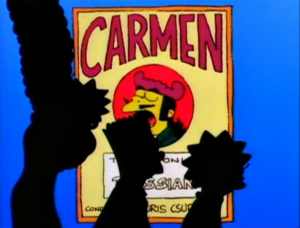
Source: The Simpsons Wiki, https://simpsons.fandom.com
Carmen is unique. Few other operas have appeared so frequently in media. The “Habanera” even caught the attention of Disney’s Pixar as it plays in the background of an emotional scene in Up (2009). The “Habanera” was featured multiple times in another family classic, Sesame Street, sung by an orange and sung by Carmen veteran Denyce Graves, who holds a special place in Opera Colorado’s history. She captivated our audiences as Carmen in the first fully-staged opera at the Ellie Caulkins Opera House. But on Sesame Street, she wooed viewers around the world with a version of the “Habanera,” the words adjusted to be a lullaby for Elmo.
Even The Simpsons go to the opera to see Carmen. You can hear the Toreador song playing in the background as Bart, Homer, and Lisa embarrass Marge by making a scene.
SAME STORY—DIFFERENT PLACE & DIFFERENT TIME
In addition to the ample references to Carmen in shows and movies you know, there have also been many adaptations of the opera. Some versions, like Francesco Rosi’s 1984 film starring Julia Migenes and Plácido Domingo, remain true to Bizet’s original work. This film was even nominated for an Academy Award for Best Picture in a Foreign Language. Other adaptations make adjustments to highlight different time periods or cultures.
In 1943 the musical Carmen Jones hit Broadway and later became a movie, Carmen Jones (1954), both featured music by Oscar Hammerstein. These adaptations took Bizet’s story out of nineteenth-century Spain and into 1940s Chicago with an all-African-American cast.
A few years later, Carmen changed again to be a nightclub singer in the 1960s for Wang Tian-lin’s The Wild Wild Rose (野玫瑰之戀), starring Grace Chang. This version of Carmen takes place in Hong Kong, and the songs are sung in Mandarin.
One of the more recent adaptations of Carmen features a name we all know and love in her acting debut: Beyoncé. Robert Townsend’s 2001 film Carmen: A Hip Hopera takes place in modern-day Philadelphia, Pennsylvania and Los Angeles, California, and changes the music’s genre to hip-hop/R&B.
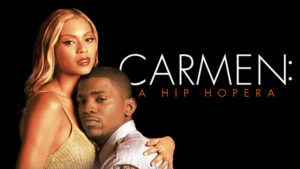
Source: IMDB
CHANGING THE NARRATIVE
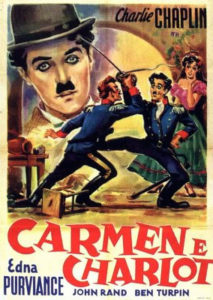
When a story becomes as popular as Carmen, artists often start to add unexpected twists. You expect death at the end of a tragic opera, and (spoiler) you are usually correct. In Bizet’s production, Carmen is killed at the end of the tale, but there are a few versions where her ending is a little different. Comedian Carlie Chaplin took on Carmen in 1915 with A Burlesque on Carmen, where Carmen, played by Edna Purviance, laughs and stands up again after being hit with a fake knife.
Modern audiences have explored more feminist endings for Carmen. This idea of shrugging off death is repeated in the Royal Opera House’s 2018 production, which gave Carmen the last word in her own story. Earlier the same year, Teatro del Maggio in Florence completely flipped the story, and in the end, Carmen kills Don José.
In other versions, Carmen does die, but the production gives her more agency over her death. Denyce Graves, having played Carmen many times, discussed Carmen’s death in an interview with NPR: “I think it’s even an act of will on her part. And she says to [Don José], ‘If you’re gonna kill me, kill me. Otherwise, get the heck out of my way.’ But I’ve played her many times that she actually runs on to the blade itself, that she feels that he doesn’t have the courage to do it himself, so she does it for him. I think it’s extremely powerful.”
SO, WHY IS CARMEN SO POPULAR?
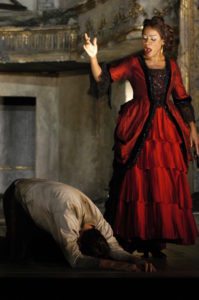
Source: Opera Colorado/P. Switzer
Now that you know some of the songs from Carmen, you will hear them everywhere. Likewise, her story has seen many iterations, with more to come. But why has Carmen infiltrated mainstream culture more than many other operas?
It could be because of Carmen herself; her character is compelling because of her free spirit. Harvard professor and scholar Daniel Albright explains, “Carmen seems to be—more or less—singing to herself, for her own self-delight…If we are shocked, at the end, to learn that she is mortal, it is because she seems to possess being more fully than anyone or anything else.” Who would not want to sing to that tune?
Maybe Carmen’s iconic status is due to the hummable ease of Bizet’s musical score, which make the songs attractive to a wide audience.
Carmen’s popularity is not a question with a singular answer. However, Carmen has stood the test of time, continuing to appear in our cultures more than 100 years after its premiere in Paris.
Come see what is special about Carmen for yourself this May. Tickets start at $35.>>
—
Do you recognize the music of Bizet’s Carmen? Have you seen a production before or just heard its music in commercials and movies? What else do you want to learn about Carmen? Let us know in the comments below!



I’m surprised there was no mention of my first exposure to the music of Carmen: Gilliagan’s Island:
https://www.youtube.com/watch?v=3JQ8yF04y9o
https://www.youtube.com/watch?v=bXId5jOTxdg
Looking forward to seeing the opera for the first time tonight!
It was the opera Carmen that made me an opera fanatic, I was in college wanting to earn extra points for my humanities and French classes and I could get 5 extra points if I went to see Carmen, and I fell in love with opera I’ve seen over 80 operas but still Carmen is my favorite.